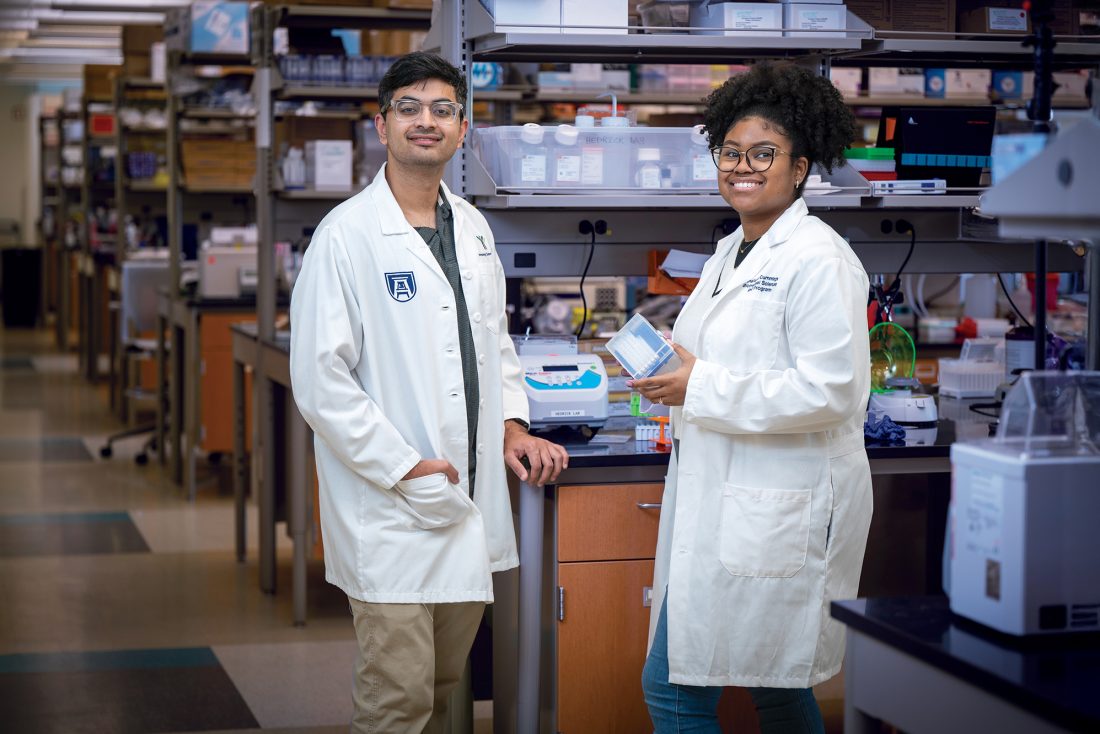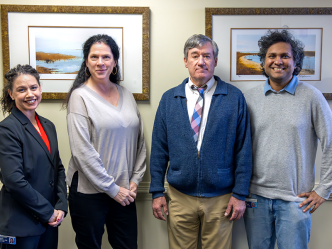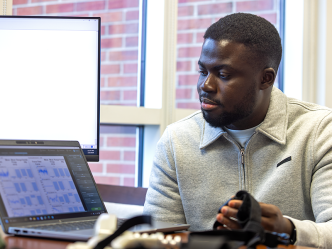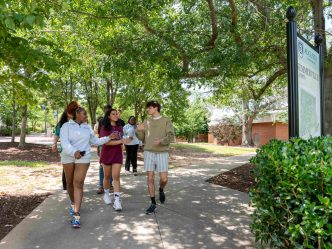Two graduate students from the Immunology Center of Georgia have been awarded the Ruth L. Kirschstein National Research Service Award from the National Institutes of Health to explore the immunological drivers behind cardiometabolic disease.
Khalia Cummings and Megh Mehta are pursuing PhDs in biomedical sciences programs at the Medical College of Georgia at Augusta University while working as graduate research assistants at IMMCG. The NIH award supports a multi-disciplinary training program to study the mechanisms of cardiometabolic disease and grants these students critical funding to advance their research and their careers.
Role of olfactory receptors
Cummings’ research, conducted under the mentorship of Marco Orecchioni, PhD, assistant professor with IMMCG, studies the progression of heart disease and the role of olfactory receptors.
“Khalia’s work dives deep into the immune system components that we suspect may affect the cardiovascular system,” Orecchioni said. “Her research is not only expanding our knowledge of these particular olfactory receptors but also paving the way for potential new therapies to help patients with cardiovascular disease.”

Cummings recognizes the urgency of her work, as heart disease remains the leading cause of death for men, women and people of most racial and ethnic groups in the United States. According to the Centers for Disease Control and Prevention, one person dies every 33 seconds from cardiovascular disease, contributing to over 702,000 deaths in 2022 — one in every five deaths.
“Our work is focused on understanding how olfactory receptors, typically associated with smell, play an unexpected role in attracting lipid cells that contribute to atherosclerosis, or the hardening of the arteries,” said Cummings, who is pursuing a PhD in vascular biology. “It’s fascinating to explore how something as seemingly unrelated as olfactory receptors might be influencing inflammation and plaque buildup in the arteries.”
Cardiometabolic disease is an umbrella term that encompasses a variety of conditions affecting the heart, blood vessels and metabolic systems. While many of these conditions are influenced by lifestyle factors, such as diet, exercise and smoking, others stem from innate biological processes, including genetic predisposition and the way the body processes fats and sugars.
It’s worth noting that cardiometabolic disease is not limited to heart attacks and strokes. It also includes lesser-known conditions like peripheral arterial disease, where blockages form in the arteries of the legs or arms, cutting off blood flow and potentially leading to severe outcomes such as tissue death and amputations.
“Heart disease doesn’t discriminate — it impacts people regardless of their background or lifestyle,” Cummings said. “If we can figure out how to block or regulate these olfactory receptors, it could slow down the progression of the disease.”
How genes affect our health
Mehta is working under the guidance of Klaus Ley, MD, co-director of IMMCG, to explore how variations in DNA influence cellular behavior and ultimately contribute to cardiometabolic diseases. Although every cell in the body contains the same DNA, different segments of that DNA affect various cell types differently.
Mehta uses highly detailed datasets that capture both genetic information and cell activity across different cell types in his patient samples. By analyzing these datasets, he aims to uncover how genetic changes alter cell function and lead to disease.
“Megh has an exceptional ability to extract meaningful findings from highly complex datasets,” Ley said. “His research is unlocking new insights into how our genetic material controls inflammation in some of us and lets it run wild in others. This could have significant implications for cardiovascular and autoimmune diseases.”

Mehta, who is in the MD/PhD program at Augusta University and working toward a PhD in molecular oncology and immunology, said he is thankful for the NIH support and the collaborative environment at IMMCG.
“This fellowship allows me to focus on research that could ultimately improve treatment outcomes for a variety of cardiovascular diseases,” he said. “I’m grateful for the mentorship and resources at IMMCG, which have been instrumental in shaping my research.”
Mehta is focused on the broader impact of his research, given that heart disease costs the United States more than $250 billion annually, according to the CDC, including health care services, medications and lost productivity.
While lifestyle factors play a role, those with a family history of cardiovascular disease are often at a much higher risk, regardless of their lifestyle choices. Mehta’s research is part of a larger effort to unravel the complexity of these genetic factors and develop better risk assessment tools, like genetic screenings used for certain cancers, that could one day provide a clearer picture of a patient’s risk of heart disease.
“Understanding and controlling our DNA’s influence can open new doors for preventing heart disease and reducing the financial burden it places on our health care system,” he said. “My work aims to uncover novel approaches that could ultimately save lives and resources.”
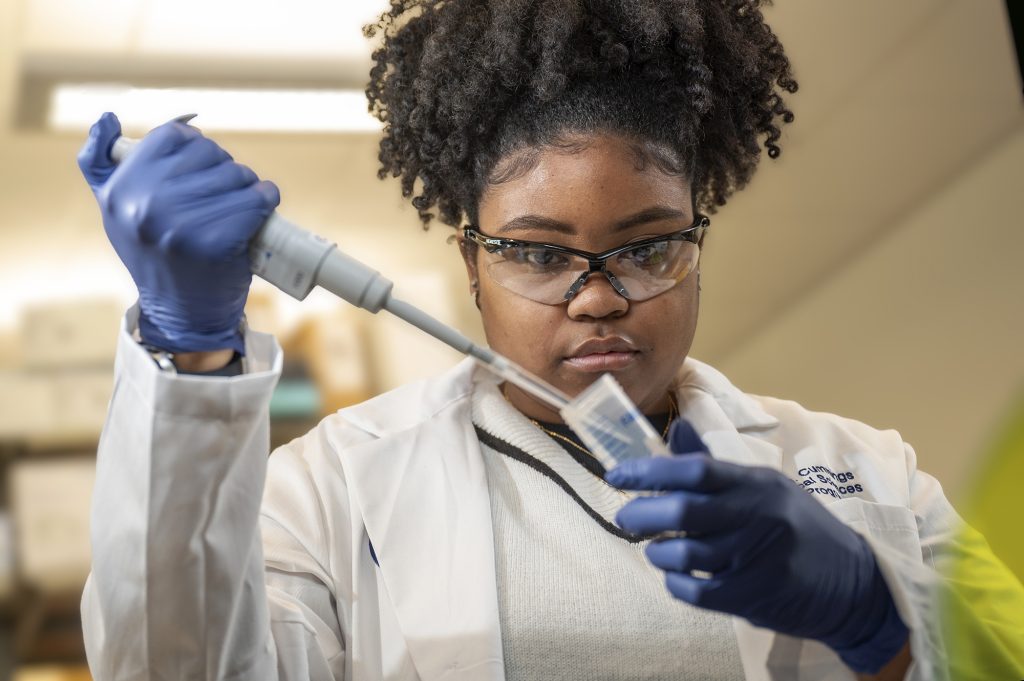
An exceptional training ground
David Stepp, PhD, emphasized the significance of these research awards. Stepp serves as the Leon Henri Charbonnier Endowed Chair in Physiology, Regents Professor in the Vascular Biology Center and associate dean for research at MCG.
“The success of Khalia and Megh, along with all the graduate students who have received these awards over the years, is a reflection of the exceptional training and mentorship provided by our faculty and the collaborative research environment throughout MCG,” Stepp said. “These service awards position them to make a lasting impact in the fields of vascular biology, immunology and beyond.”
Cummings and Mehta join two other Augusta University graduate students who have earned the NIH award this year: Lucas Yearwood, who is mentored by Meghan McGee-Lawrence, PhD, chair of MCG’s Department of Cellular Biology and Anatomy, and Hannah Goodley, mentored by Jennifer Sullivan, PhD, dean of The Graduate School and professor in the Department of Physiology at MCG.
As Augusta University continues to focus on the future of research, these awards underscore the campus’s commitment to supporting the next generation of scientific leaders.
“When I started this journey, I didn’t know much about cardiovascular research, but my mentor made the concepts so engaging and accessible,” Cummings said. “My experience at IMMCG has shown me that you don’t have to know everything on day one. Science is about learning and asking the right questions, and I’ve been fortunate to have a great support system that encourages me to do just that.”
Ley highlighted his faculty’s focus on scientific training and praised the talents of the students working in the labs.
“Our mission is to foster curiosity, innovation and a dedication to improving health outcomes,” Ley said. “Our graduate students exemplify that mission, and we are incredibly proud of their accomplishments.”
Discoveries at Augusta University are changing and improving the lives of people in Georgia and beyond. Your partnership and support are invaluable as we work to expand our impact.
 Augusta University
Augusta University
